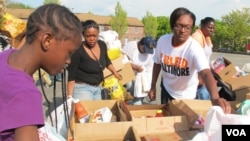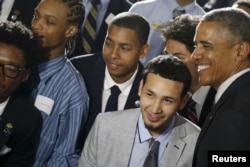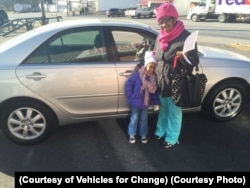In the wake of civil unrest that flared last week in Baltimore, Maryland, individuals and groups are working to defuse tensions and rebuild good will. They’re organizing donations of food, assisting with transportation and exploring ways to improve job prospects and other opportunities in the eastern U.S. city’s neediest neighborhoods.
At the national level, President Barack Obama on Monday announced the launch of a private-sector foundation, My Brother’s Keeper Alliance.
The nonprofit will aim to close the so-called “opportunity gap” that leaves minority groups – particularly young black males – at a disadvantage in communities across the nation.
These efforts come a week after rioting and looting erupted following the April 19 death of Freddie Gray, a 25-year-old black man who suffered a fatal spinal cord injury while in the custody of Baltimore police. Six officers have been indicted on charges including second-degree murder, manslaughter and assault.
“That sense of unfairness and of powerlessness, of people not hearing their voices, that’s helped fuel some of the protests we’ve seen in places like Baltimore and Ferguson [Missouri] and right here in New York,” Obama said. He spoke at Lehman College in the Bronx after meeting with students and business leaders.
My Brother’s Keeper Alliance – to which corporations such as Sprint, PepsiCo and consulting firm Deloitte already have pledged $80 million in financing or in-kind donations – will work in tandem with My Brother’s Keeper. Obama introduced that federal policy initiative in February 2014 to improve education and job prospects for young men of color.
Rallying in Baltimore
That’s a goal shared in Baltimore, where the broader community is rallying to help address a range of needs.
Celeste Amato, head of the Association of Baltimore Area Grantmakers, told VOA she expected to bring funders together, perhaps as early as this week, "to have a conversation and begin to organize ourselves around youth engagement very specifically" to supplement existing commitments. She said some member organizations, such as the Open Society Institute and Annie E. Casey Foundation, already have been focused on that front.
Service providers working in poor neighborhoods have relayed youths' concerns, she said. "One of the things we hear is rec centers are closed, or 'they're not for us.'"
In the Baltimore Mayor’s Office of Economic Employment, spokesman Brice Freeman said the city’s YouthWorks program places 5,000 14- to 21-year-olds in paid summer jobs – in public parks, recreation centers and camps as well as with private-sector employers. The agency’s Hire One Youth campaign encourages businesses to take on youths for at least five weeks and for at least minimum wage.
“We’re talking about needing more opportunities for young people” to have healthy, productive lives, Freeman said, a mission that has taken on new urgency.
Quick responses
Some do-gooders have taken immediate action.
When looting and fire shuttered a mall supermarket, a CVS drugstore and some corner markets in West Baltimore, some city residents and supporters arranged for a pop-up, open-air pantry outside the Lillian Jones Recreation Center.
Late Thursday afternoon, roughly a hundred residents had lined up for more than 23,000 pounds of canned goods and fresh produce delivered by the Maryland Food Bank, plus disposable diapers, tissues and other essentials solicited via Facebook.
Watch related video by VOA's Chris Simkins:
“It means a lot, especially with a lot of the stores messed up and people just cannot get the stuff that they need,” said Trakiesha Peels, 26, who scooped up canned fruits and juices, fresh greens, potatoes, carrots, onions and tortilla chips. With two young children, “the fruit always goes first.”
Shelly Laskin Hettleman, a Maryland state legislator who lives just outside the city, was among the organizers – and she’s coordinating ongoing neighborhood “volunteer opportunities” through social media.
“I view all of this as a regional issue,” Hettleman said, noting many in her district work in the city or grew up there.
Driven to help
When he heard that more than 140 cars were destroyed during rioting in Baltimore, Marty Schwartz shifted into high gear. He’s the founding president of Vehicles for Change, a nonprofit organization that fixes up donated cars and sells them, cheaply, to low-income people in metropolitan Baltimore and Washington, D.C.
Usually, only people who need work transportation are eligible to buy the rehabbed cars. Schwartz reconsidered after getting a call about an unemployed woman whose car was torched and who still needed reliable rides to medical appointments for her daughter, who has Down syndrome.
“To put that many people out of work or out of a situation where they could care for family – that’s not right,” he said.
So, Schwartz rolled out Rebuild Baltimore, a goal to get 50 cars to needy Baltimore households this month. (The organization typically sells 350 a year in Baltimore and beyond.) Prices average $800, though Schwartz is trying to defray some of the cost through fundraising. Other conditions remain the same: Customers get 12-month loans to establish credit and six-month warranties to ensure that vehicles run smoothly.
“We’re here to help families that have been impacted by this devastation,” said Schwartz, who started the program in 1999.
The organization also operates the Center for Automotive Careers, a facility in Halethorpe, near Baltimore, that trains ex-offenders and youths aging out of foster care. On Monday, it opened a service center open to the public, with maintenance provided by ex-offenders trained in automotive repair.








